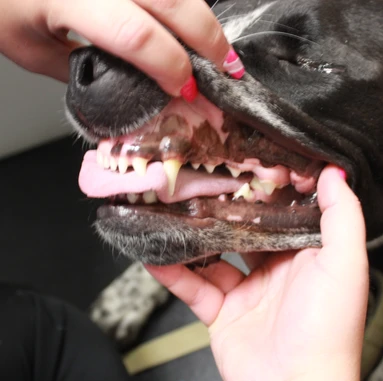Dogs’ and cats’ baby (deciduous) teeth start to erupt at several weeks of age. Their deciduous teeth are replaced by their permanent dentition between 4-6 months of age. When our pets are puppies and kittens is the perfect time to get them used to having their mouths opened and their teeth and gums touched. This will not only make your pet more amenable to oral exams at vet visits, but they will also be much more likely to tolerate routine teeth brushing. Also, remember to discuss appropriate chew toys, treats, and diet options with your veterinarian. Bones, antlers, and tennis balls can cause abnormal dental wear and even broken teeth! We strongly recommend products approved by VOHC (Veterinary Oral Health Council).
The progression of dental disease starts with the accumulation of tartar and bacteria on the tooth’s surface. The tartar can form a thick calculus, and the bacteria will begin to penetrate the space between the gingiva (gums) and the tooth, causing inflammation and weakening the attachment between the tooth and the bone that holds it in place. Over time, painful gingivitis can occur, the tooth can become loose, and bacteria can cause an abscess. Your veterinarian may recommend a COHAT (Comprehensive Oral Health Assessment and Treatment) for routine cleaning to prevent this from occurring OR to address these problems after they have already occurred.
COHATs at our hospital require the patient to undergo general anesthesia. Full mouth radiographs are performed and viewed by the doctor to identify problems under the gumline. Also, the veterinarian examines each surface of every tooth for fractures, pockets of infection, and mobility. This helps to identify whether any extractions are necessary. An extraction is typically performed by creating a flap in the gums, drilling out the unhealthy tooth and root (cat and dog teeth can have up to 3 roots), and surgically closing the gingival flap overtop. All remaining teeth are cleaned using an ultrasonic scaler to remove tartar under the gumline and then polished.
Take time to discuss your pet’s oral health with your veterinarian, as ignoring your pet’s dental care can lead to oral pain, poor overall health, costly extractions, and horrible stinky breath!

